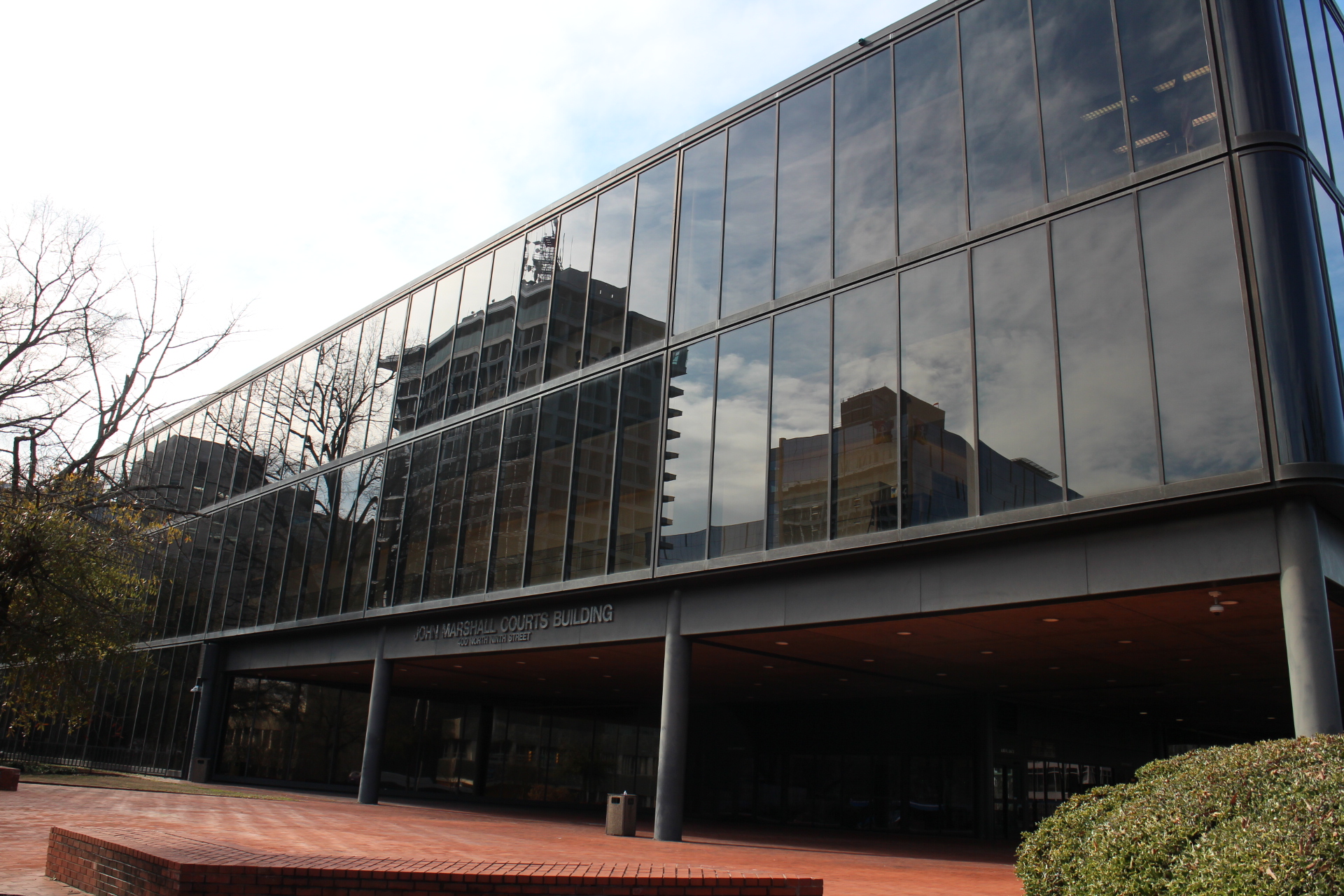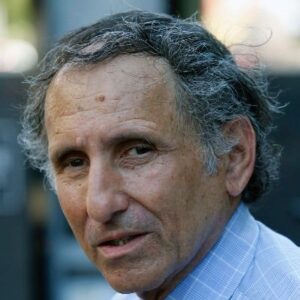A lawsuit challenging Richmond’s new approach to financing the Diamond District project was dismissed in court Friday, seemingly clearing the way for the city to move forward with issuing bonds for the ballpark-anchored development.
After hearing arguments for about an hour Friday, Circuit Judge W. Reilly Marchant tossed out the complaint from local activist Paul Goldman, who alleged that his rights to petition for a referendum of city voters to weigh in on the change were unfairly burdened due to an unclear process in the city’s charter.
Goldman, who similarly challenged the proposed casino in South Richmond that voters twice rejected in separate referendums, filed the lawsuit in May seeking to delay the bond issuance and receive direction from the court on how he could properly petition and collect signatures to require a referendum.
Goldman argued that such details are not specified in the city’s charter and that without them, a petition could be deemed insufficient and ultimately a waste of time and money.
Time was also at issue in the case, as Goldman argued that more time to collect signatures would be provided if the bonds were being issued by a county, which state law requires to hold a referendum.
Goldman said the city bonds could only be challenged if he collected the roughly 11,000 signatures that would be needed within 30 days of the financing ordinances’ approval. Marchant acknowledged in Friday’s hearing that that 30-day window expires June 11.
“I want to exercise my right, but they’ve put an incredible burden on me,” Goldman said in the hearing. Later, he added: “I can’t make the challenge until I know the burden.”
Marchant maintained that he could not rule on the arguments in Goldman’s complaint because no action had been taken to petition for a referendum. Marchant told Goldman that he was effectively asking him to provide an advisory opinion on a hypothetical scenario that had not yet played out.
“That’s not what courts do,” Marchant said.
Later, he added: “It’s not properly before the court whether it’s an unconstitutional burden, because no effort has been made.”
Goldman’s lawsuit challenged City Council’s approval allowing the city to issue $170 million in bonds to finance the new stadium for the Richmond Flying Squirrels and infrastructure improvements for the $2.4 billion mixed-use development’s first phase.
The funding approach, which puts the city on the hook to repay the bonds should the stadium not be built or the larger development fail, is a change from a previous plan to issue non-obligation bonds through a community development authority and with collateral from developer Diamond District Partners.
The move is projected to save the city $215 million in debt costs over the 30-year length of the loans, while also capturing $24 million in state sales tax incentives that are set to expire July 1. Goldman’s lawsuit threatened to delay the bond issuance to after June, putting the city at risk of losing the $24 million in incentives.

A rendering of the new stadium planned along Arthur Ashe Boulevard south of The Diamond. (BizSense file)
The timing of the bond issuance is integral to the city’s planned schedule to deliver the new stadium in time for the 2026 baseball season. Major League Baseball, which oversees minor-league venues like The Diamond and is requiring all pro venues to meet new facility standards, had imposed a 2025 deadline but is allowing Richmond more time in light of the project’s progress.
The $170 million in bonds consist of $130 million in general obligation bonds to fund the ballpark and $40 million in lease revenue bonds for the infrastructure improvements. The infrastructure bonds would be paid for with lease payments from the Flying Squirrels, which would total $66 million over 30 years, while the bond debt for the $110 million stadium would be paid off using tax revenue generated from the surrounding new development.
Goldman argued that the city shouldn’t be issuing bonds for the project because it involves private development and is not solely for a public purpose. He maintained that the city is only issuing the bonds to keep the Flying Squirrels ballclub from leaving Richmond.
Marchant disagreed, stating in his rulings that the city can issue bonds for a governmental purpose, in this case providing citizens with a new ballpark, even if there is incidental benefit to a private enterprise.
Following the hearing, Goldman said he didn’t know what if anything he would do next, describing the petition process upheld by the ruling as impractical and too expensive. He said he might pursue one of his arguments further in federal court, but he said doing so wouldn’t affect the bond issuance timing.
In a written statement after the hearing, Richmond Mayor Levar Stoney said: “We are full speed ahead on delivering a world-class baseball stadium and an exciting new neighborhood for all to enjoy. The Flying Squirrels are here to stay in Richmond!”
The city’s legal team in the case was led by Deputy City Attorney Wirt Marks.
Late last month, Richmond announced that the $130 million bond issuance for the new ballpark helped the city achieve its first AAA credit rating, the highest possible, from bond rating agency Fitch Ratings.
A lawsuit challenging Richmond’s new approach to financing the Diamond District project was dismissed in court Friday, seemingly clearing the way for the city to move forward with issuing bonds for the ballpark-anchored development.
After hearing arguments for about an hour Friday, Circuit Judge W. Reilly Marchant tossed out the complaint from local activist Paul Goldman, who alleged that his rights to petition for a referendum of city voters to weigh in on the change were unfairly burdened due to an unclear process in the city’s charter.
Goldman, who similarly challenged the proposed casino in South Richmond that voters twice rejected in separate referendums, filed the lawsuit in May seeking to delay the bond issuance and receive direction from the court on how he could properly petition and collect signatures to require a referendum.
Goldman argued that such details are not specified in the city’s charter and that without them, a petition could be deemed insufficient and ultimately a waste of time and money.
Time was also at issue in the case, as Goldman argued that more time to collect signatures would be provided if the bonds were being issued by a county, which state law requires to hold a referendum.
Goldman said the city bonds could only be challenged if he collected the roughly 11,000 signatures that would be needed within 30 days of the financing ordinances’ approval. Marchant acknowledged in Friday’s hearing that that 30-day window expires June 11.
“I want to exercise my right, but they’ve put an incredible burden on me,” Goldman said in the hearing. Later, he added: “I can’t make the challenge until I know the burden.”
Marchant maintained that he could not rule on the arguments in Goldman’s complaint because no action had been taken to petition for a referendum. Marchant told Goldman that he was effectively asking him to provide an advisory opinion on a hypothetical scenario that had not yet played out.
“That’s not what courts do,” Marchant said.
Later, he added: “It’s not properly before the court whether it’s an unconstitutional burden, because no effort has been made.”
Goldman’s lawsuit challenged City Council’s approval allowing the city to issue $170 million in bonds to finance the new stadium for the Richmond Flying Squirrels and infrastructure improvements for the $2.4 billion mixed-use development’s first phase.
The funding approach, which puts the city on the hook to repay the bonds should the stadium not be built or the larger development fail, is a change from a previous plan to issue non-obligation bonds through a community development authority and with collateral from developer Diamond District Partners.
The move is projected to save the city $215 million in debt costs over the 30-year length of the loans, while also capturing $24 million in state sales tax incentives that are set to expire July 1. Goldman’s lawsuit threatened to delay the bond issuance to after June, putting the city at risk of losing the $24 million in incentives.

A rendering of the new stadium planned along Arthur Ashe Boulevard south of The Diamond. (BizSense file)
The timing of the bond issuance is integral to the city’s planned schedule to deliver the new stadium in time for the 2026 baseball season. Major League Baseball, which oversees minor-league venues like The Diamond and is requiring all pro venues to meet new facility standards, had imposed a 2025 deadline but is allowing Richmond more time in light of the project’s progress.
The $170 million in bonds consist of $130 million in general obligation bonds to fund the ballpark and $40 million in lease revenue bonds for the infrastructure improvements. The infrastructure bonds would be paid for with lease payments from the Flying Squirrels, which would total $66 million over 30 years, while the bond debt for the $110 million stadium would be paid off using tax revenue generated from the surrounding new development.
Goldman argued that the city shouldn’t be issuing bonds for the project because it involves private development and is not solely for a public purpose. He maintained that the city is only issuing the bonds to keep the Flying Squirrels ballclub from leaving Richmond.
Marchant disagreed, stating in his rulings that the city can issue bonds for a governmental purpose, in this case providing citizens with a new ballpark, even if there is incidental benefit to a private enterprise.
Following the hearing, Goldman said he didn’t know what if anything he would do next, describing the petition process upheld by the ruling as impractical and too expensive. He said he might pursue one of his arguments further in federal court, but he said doing so wouldn’t affect the bond issuance timing.
In a written statement after the hearing, Richmond Mayor Levar Stoney said: “We are full speed ahead on delivering a world-class baseball stadium and an exciting new neighborhood for all to enjoy. The Flying Squirrels are here to stay in Richmond!”
The city’s legal team in the case was led by Deputy City Attorney Wirt Marks.
Late last month, Richmond announced that the $130 million bond issuance for the new ballpark helped the city achieve its first AAA credit rating, the highest possible, from bond rating agency Fitch Ratings.





I hope Goldman won’t appeal, and pursue a course that costs the city millions and millions extra for no reason. At that point it’s really going to look like he doesn’t care at all for the city
We already know Goldman doesn’t care about the city, unfortunately. All him and Wilder ever want to do is keep themselves in the spotlight.
I mean, that is why he live in New York City, or Moscow or whereever in RIchmond he doesn’t live, right?
And Stoney of course has DEEP ties to Richmond, correct? He has spent countless decades here, right?
Rather see a few “wasted” dollars to fight a lawsuit that some people think has merit then go into the hands of more donors to the Mayor’s campaign contributors list/city vendor list. How many millions is it going to cost us for the vacant Coliseum this year, $3M, and then another $3M next year to finally tear it down. Waste, fraud and abuse are this city’s motto so why not a suit with merit cost us a little in tax funds. It is not as if the administration is planning any rebates or refund this FY anyway!
I do not agree with your take at all.
You don’t think the promoters of the stadium have some “interest” beyond “the city”?
I am not sure that you are naive.
Glad to see this lawsuit was dismissed. There’s certainly some ambiguity in the city charter that should be cleared up but that shouldn’t hamstring us now. Honestly I’m just glad to see the steps being taken to keep the squirrels and get the diamond district started!
Richmond needs a new baseball statium?
Still trying to get past the irony — 20 years of fighting over city funding a ballpark, agreeing to go with private funding, then reversing 180 degrees at the last minute. What an extraordinary waste of time and effort.
Welcome to Richmond – where the past is the present and the future is just six letters that disappear
Richmond has bigger issues ahead – electing qualified candidates for Mayor, Council and School board – The GA dealt a huge blow to the city when it passed legislation keeping all Virginia cities independent and unable to expand. Richmond suffers from the cannibalization of State owned properties being tax exempt. With rising property values the property tax burden on Richmond residents may become untenable – look at recent articles in this publication about some businesses selling or struggling due to rising property taxes. Keep the Capital in Richmond, but move state buildings to the counties and sell the land to… Read more »
This seems like a problematic plan. Moving the majority of downtown jobs to the counties raises several concerns. Firstly, what would replace these agencies in the vacant CBD buildings? Currently, there isn’t a significant influx of businesses to fill spaces that are already vacant. Relocating government agencies out of downtown would lead to fewer people living in or close to downtown, exacerbating the existing issue of suburban sprawl. Additionally, those workers would no longer frequent city businesses, potentially harming the city’s economy. Regarding annexation, it’s important to recognize that incorporating Henrico and Chesterfield would come with their populations and votes.… Read more »
Thank you for pointing out something I have been pointing out for years.
I’ll go even further: it won’t happen ALSO because the Richmond political class doesn’t want it because they know what you know — the suburbs will dilute the vote and they want more competent and less corrupt leadership.
So in summary if he can get 11,000 signatures before the bonds are issued and get it back to court that could lead to a judicial hold until a referendum? FYI if the City is going to take advantage of the state sales tax change before July 1st should they not have the bond ready to go since July 1st is less than three weeks away. PS The general obligation bonds are just that GENERAL and paid for by all taxpayers of the City of Richmond not the properties surrounding the stadium. There is no TIF or special assessment district… Read more »
He would have to get the signature by end-of-business today. He pursued a dumb strategy designed more to put himself in the headlines than to actually accomplish anything, and it failed.
Had he attempted to do anything else, he might have had a small chance at getting in the way enough to have been paid off, which I think was his ultimate goal.
His goal was likely to put a spotlight on what the city is doing, and maybe a self-interested bookmark on his take so that if this proves to be the unwise move that many non-baseball interested people know it to be, esp given Hissoner’s history, it will make him look smart by comparison.
I don’t think he thought his suit would go anywhere.